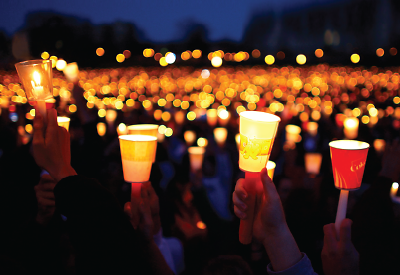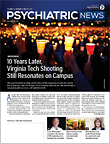A decade after the shooting at Virginia Tech, mental health services at the university in Blacksburg, Va.—and at colleges around the country—are better prepared to care for students routinely as well as in emergencies.
During the April 16, 2007, incident, the gunman, Seung-Hui Cho, a university senior, killed 32 students and professors before killing himself.
Like everyone else on campus that day, Joseph Frieben, M.D., the staff psychiatrist at Virginia Tech’s Cook Counseling Center, was locked down until the incident was over.
“Everyone wanted to just do something and be helpful in some way, but in reality there was absolutely nothing that we could do,” he told Psychiatric News a few weeks later. “Time moved very slowly.”
Before the day was over, Frieben was on the phone with Edward Kantor, M.D., his former residency training director at the University of Virginia and chair of the Disaster Committee of the Psychiatric Society of Virginia (PSV). Kantor, Frieben, and leaders of the PSV wanted to organize an appropriate response to the tragedy. One standard lesson of disaster psychiatry is strengthening local resources while discouraging well-meaning outsiders from parachuting in to the rescue. Kantor and Frieben asked PSV members to volunteer their services, not in Blacksburg, but in their hometowns elsewhere in Virginia (and later, in surrounding states), where Virginia Tech students would be headed once the semester was over.
“We served as a coordinating buffer,” recalled Kantor in an interview. “The event was over, and sometimes too much help coming in only perpetuates the event.”
Anniversaries of the tragedy may remind the Virginia Tech community of the students and faculty members whose lives were cut short, but the university’s response in the intervening years has been positive, said Frieben, who still works at the Cook Center.
“There’s less stigma,” he said. “Faculty and staff are more ready to refer a student with whom they are concerned to the Dean of Students Office or to the counseling center. The usage of services has grown—as it has at college counseling centers generally—and there appears to be more willingness to seek help. The university has been supportive, expanding the center’s staff, although community resources still remain limited.”
College counseling services are busier than ever these days.
“At colleges and universities in general, there is now a stronger spotlight on mental health,” said Ludmila De Faria, M.D., a clinical assistant professor of psychiatry and a staff psychiatrist at the Florida State University Student Health Center in Tallahassee and chair of APA’s Caucus on College Mental Health. “Today, there is more awareness that things can go wrong.”
In the three or four years after the shooting at Virginia Tech, there was a dramatically increased demand for services there, particularly for anxiety, but that spike in need eventually died down as a generation of students moved on, said Frieben.
One troubling aspect of the shooting was that late in 2005, more than a year earlier, Cho was reported to campus police for stalking a women student and briefly committed involuntarily to a psychiatric hospital in Radford, Va. He was released and kept two initial appointments at the university’s counseling center. However, no outpatient commitment order was ever received by the center, and a state report on the event is not clear about whether he received further care.
To avoid losing track of students referred out, the 42-person Cook Center now employs a case manager and coordinator of emergency services, Robert Ritchey, M.S. He maintains communication with community clinicians and oversees emergency services and crisis management of students, attends all hearings at the hospital, and follows up after involuntary hospitalizations. In addition, a second psychiatrist was hired in 2007, a post now filled by James Reinhard, M.D., a former commissioner of mental health for Virginia.
“In the past, college counseling centers would refer out their more severely ill patients to the community, but you can lose track of them sometimes,” said Frieben. “Today, there is a reversal, with more emphasis on keeping the most unwell students in house.”
De Faria and Frieben both noted the increasing role of care teams on college and university campuses. Care teams comprise representatives from the dean of students, health and counseling centers, faculty, enrollment offices, and campus security. Anyone with a concern about a student can notify the care team, which then can break down jurisdictional silos and exchange information to be sure the student receives needed care and doesn’t fall through the cracks.
April 16, 2007, left its mark on everyone in the Virginia Tech community, said Frieben. For a while, there was no respite.
“For three years after 4/16, summer didn’t feel like summer,” said Frieben. “It took four years before summer felt like summer again, with some down time.” ■
“Va. Psychiatrists Respond to Tragedy at Tech” can be accessed
here. “Mass Shootings at Virginia Tech,” the report of the Virginia governor’s review panel, is available
here.

